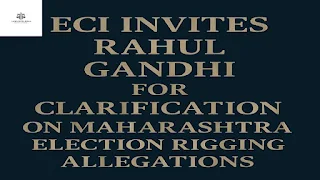ECI Invites Rahul Gandhi for Clarification on Maharashtra Election Rigging Allegations
ECI Responds to Allegations with Formal Invitation
In a significant development, the Election Commission of India (ECI) has invited Leader of Opposition Rahul Gandhi for an official interaction to address his recent allegations of rigging in the Maharashtra Assembly elections, held in 2024. The invitation, confirmed by official sources, was sent via email on June 12 and also physically delivered to Gandhi’s residence.
The move comes in response to public accusations made by the senior Congress leader regarding irregularities in the electoral process, particularly in the Nagpur South West constituency—represented by Maharashtra CM Devendra Fadnavis.
Rahul Gandhi’s Key Allegations
Rahul Gandhi, in a series of public statements and a detailed post on social media platform X, has alleged the following:
-
The voter list in Nagpur South West constituency witnessed an 8% growth within just five months.
-
Certain polling booths saw a surge of 20–50% in registered voters.
-
Booth Level Officers (BLOs) reported instances of unknown individuals casting votes.
-
Media investigations revealed thousands of voters without verified addresses.
-
Gandhi accused the Election Commission of silence or complicity, calling the situation not a glitch, but an instance of “vote theft.”
-
He demanded the immediate release of machine-readable digital voter rolls and CCTV footage from polling booths.
ECI Denies Allegations and Defends Election Protocols
The Election Commission has rejected the allegations, terming them as misinformed and misleading. It also defended its procedures and clarified its stance on the following issues:
On CCTV Footage Retention
The ECI recently updated its guidelines, limiting the retention period for CCTV and webcasting footage to 45 days, provided the election results are not legally challenged. This move, the Commission argues, is consistent with the legal framework under the Representation of the People Acts of 1950 and 1951, and protects voter privacy and security.
Privacy Concerns Raised by EC
The Commission strongly opposed calls for releasing polling station footage, warning of potential identification and harassment of voters based on their voting behavior or abstention. It stated that:
-
Such footage could be misused by political parties to pressure or intimidate voters.
-
The demand to release CCTV recordings is contrary to privacy norms and could disrupt the free and fair nature of elections.
Legal Justification
The ECI emphasized that the video footage is an internal administrative tool, not a mandatory record, and the 45-day retention policy is in line with the window for filing an Election Petition (EP) post-result.
The Bigger Political Context
Rahul Gandhi’s allegations arrive amidst the broader national discourse on electoral transparency, data security, and digital oversight in Indian elections. His public statements, especially calling the ECI “silent or complicit,” have escalated the tension between the Opposition and the electoral body.
The ECI’s invitation, therefore, is not merely a formality but a test of democratic dialogue and institutional accountability. By opening its doors to discussion, the EC appears to be aiming for clarity and de-escalation, while standing firm on its operational frameworks.
Conclusion: Will Dialogue Bridge the Divide?
As the 2025 electoral narrative unfolds, this face-off between Rahul Gandhi and the ECI could become a landmark episode in the debate on electoral integrity in India. The upcoming interaction, if accepted, could offer clarity, correct narratives, and perhaps even lead to procedural reforms, especially around digital transparency and polling station security.
Whether the meeting leads to consensus or further confrontation remains to be seen—but it clearly reflects the growing public demand for accountable, verifiable, and tamper-proof electoral systems in the world’s largest democracy.
📌 Stay tuned for further updates on this developing story around #ElectoralReforms and #DemocracyInAction.

.jpg)
.jpg)

.jpg)

.jpg)
.jpg)
.jpg)


Comments
Post a Comment